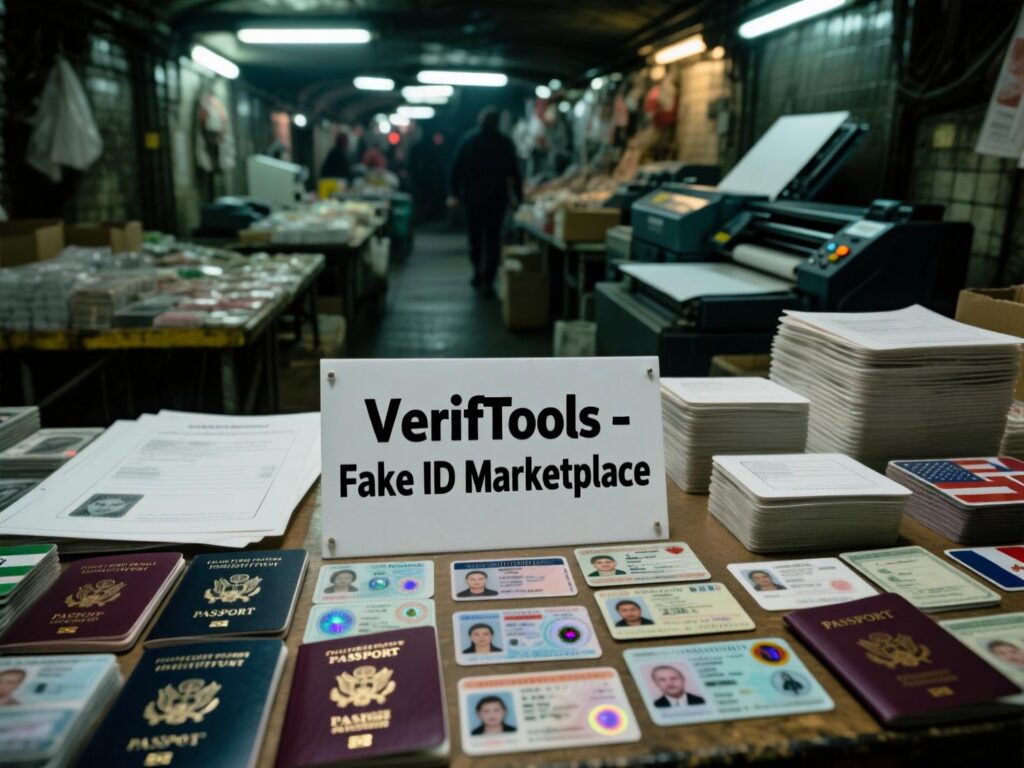US and Dutch Authorities Take Down Crypto-Fueled Fake ID Marketplace
Dutch cybercrime police, in collaboration with the FBI, have successfully dismantled VerifTools, a notorious online marketplace for fake IDs. The platform specialized in producing highly realistic passports and driver’s licenses, offering them to customers in exchange for cryptocurrency. Authorities described it as one of the internet’s most prolific and trusted suppliers of forged identification, catering to a global demand for counterfeit documents.
Investigators highlighted that VerifTools’ products were widely used to bypass Know Your Customer (KYC) checks on financial platforms, enabling fraud, money laundering, and other illegal activities. By taking down this marketplace, officials have disrupted a critical pipeline for cybercriminals and struck a major blow against digital identity fraud networks. They emphasized that the operation not only halts VerifTools’ activities but also sends a strong deterrent message worldwide.
What happened
In a coordinated operation, Dutch authorities took control of two physical servers in Amsterdam and 21 virtual servers, while the FBI seized two domains and a promotional blog linked to the site. Visitors to the old URLs now see a seizure banner from U.S. and Dutch law enforcement.
The FBI’s Albuquerque Division called the takedown “a major step in protecting the public,” underscoring how fake identity services fuel broader fraud and identity theft.
Inside the VerifTools fake ID marketplace
According to court filings and official statements, VerifTools’ operators sold counterfeit IDs for all 50 U.S. states and multiple foreign countries, priced as low as $9, with payment accepted in cryptocurrency. U.S. investigators estimate the marketplace generated about $6.4 million in revenue. Dutch estimates put annual turnover near €1.3 million (~$1.5 million). Department of JusticeThe Hacker NewsCybernews
The site reportedly let customers upload a passport photo and enter personal details that were then printed onto convincing templates. Undercover agents even ordered New Mexico driver’s licenses to document how the service worked.

Why it matters
Fake IDs aren’t just for underage bar-hopping anymore. Authorities say services like this are routinely used to evade KYC/AML controls, open mule accounts, and siphon funds from crypto platforms and banks. The VerifTools fake ID marketplace amplified those risks at scale by offering cheap, fast, and convincing documents.
Experts note today’s counterfeits often include holograms, polycarbonate layers, scannable barcodes, and UV-reactive inks, making them hard to spot without specialized tools an arms race worsened by AI-assisted image generation.
The tech and the trend
Security analysts describe a maturing criminal “ID-as-a-service” ecosystem that looks and feels like mainstream e-commerce: slick websites, crypto checkout, stepped-up customer support—and even return policies. With AI tools improving image fidelity and template realism, defenders are leaning on layered verification that blends document forensics, facial biometrics, liveness checks, and behavioral signals.

What’s next
Dutch police say they’ll keep mining seized servers to identify operators and heavy users. For platforms facing synthetic and forged identities, the guidance is clear: stack multiple verification signals and monitor for anomalies post-onboarding. Meanwhile, the case signals growing cross-border appetite to disrupt not just criminal buyers but the infrastructure that supplies them.
Key numbers at a glance
23 servers seized (2 physical, 21 virtual) powering the operation.
2 domains + 1 blog taken over by law enforcement.
$6.4 million in estimated revenue; €1.3 million annual turnover in the Netherlands.
$9 starting price per fake ID, crypto accepted.
Seizure banner live on former URLs.

Conclusion
Authorities’ takedown of the VerifTools fake ID marketplace delivers a clear signal: identity fraud networks are firmly in the crosshairs of global regulators. The crackdown underscores growing international cooperation, with agencies determined to disrupt underground markets that enable fraud, money laundering, and KYC evasion.
Looking ahead, experts expect more coordinated operations, advanced server-side forensics, and stricter verification protocols across fintech and crypto platforms. By tightening defenses, regulators aim to stay one step ahead of fraudsters and limit the exploitation of weak identity checks. The VerifTools case marks only the beginning of a broader push against digital ID crime.
FAQs
Q1 : What was the VerifTools fake ID marketplace and how did it work?
A : VerifTools was an online storefront that sold forged IDs for both the U.S. and abroad. Customers uploaded photos and personal details, paid in cryptocurrency, and received highly realistic fake documents.
Q2 : How cheap were the documents and how much did the site earn?
A : Prices reportedly started at just $9, while U.S. authorities estimate the marketplace generated around $6.4 million in revenue during its operation.
Q3 : Why is this takedown a big deal for KYC and AML?
A : The shutdown removes a major supplier of forged documents that criminals used to bypass KYC/AML checks, helping curb account takeovers and large-scale crypto fraud.
Q4 : What defenses can companies deploy now?
A : Firms can strengthen defenses by layering document verification with facial biometrics, liveness detection, and behavioral risk scoring—alongside continuous monitoring after onboarding.


